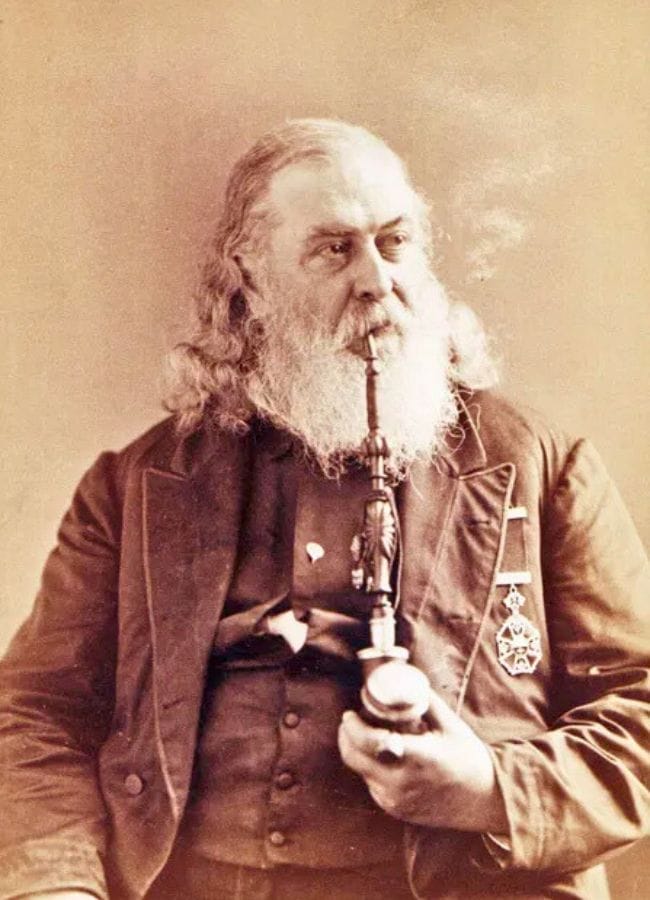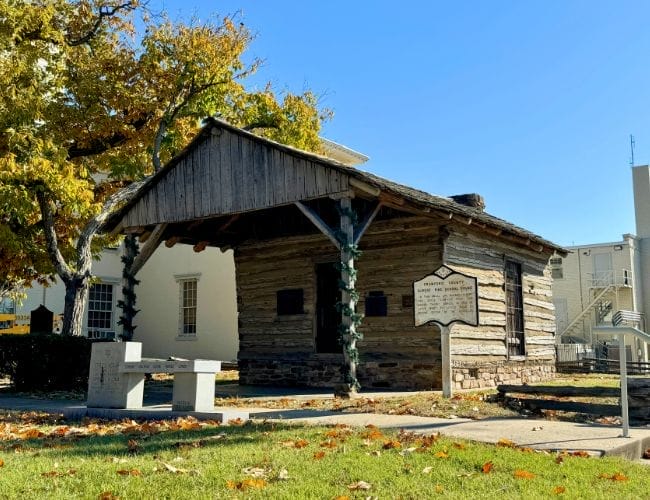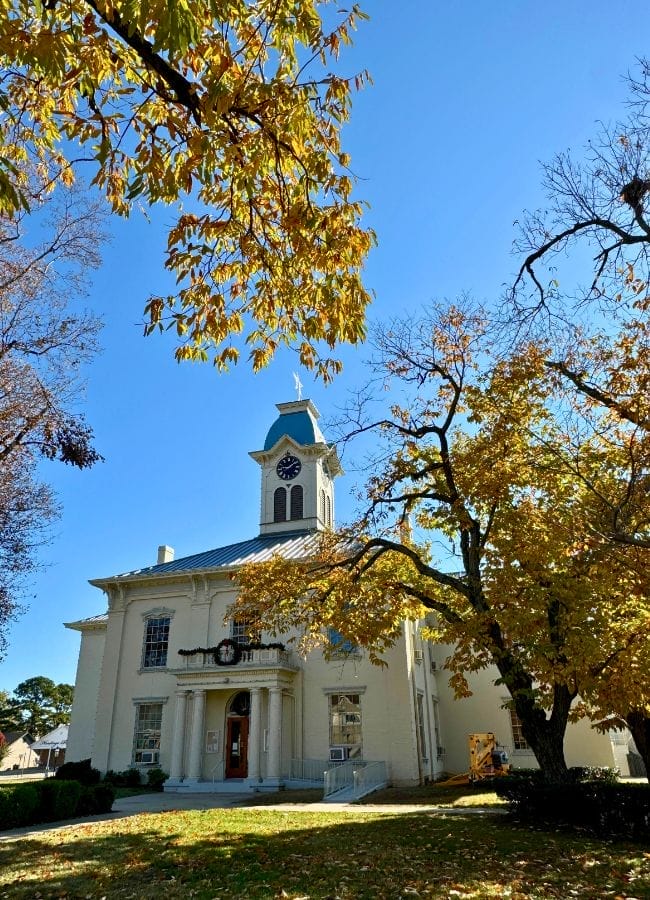

Uh oh...
It appears that you're using a severely outdated version of Safari on Windows. Many features won't work correctly, and functionality can't be guaranteed. Please try viewing this website in Edge, Mozilla, Chrome, or another modern browser. Sorry for any inconvenience this may have caused!
Read More about this safari issue.

On a recent stop on our Arkansas Courthouse Tour, I noticed a humble log cabin on the grounds of the Crawford County Courthouse in Van Buren. Downtown Van Buren is a charming hub of history and culture, and as a native Texan, I’ve enjoyed uncovering the stories behind Arkansas’s landmarks. But this sight struck me as unusual. On the lawn of one of the most architecturally elegant courthouses in the state sat a rustic wooden structure, a stark contrast to the surrounding grandeur.
Curious, I approached the log cabin to read the historical marker. The inscription told the story of the pioneer schoolhouse and the man behind it: Albert Pike, a fascinating figure whose life shaped early Arkansas and even reached the highest levels in Washington.

Who Was Albert Pike?
Albert Pike was born in Boston, Massachusetts, the grandson of colonial founding fathers. A man of diverse talents, Pike was a teacher, writer, lawyer, soldier, Grand Master, and Brigadier General who would leave an indelible mark on history, bringing 19th-century Arkansas along with him.
Pike is perhaps best known for his multifaceted career and contributions to law, literature, Native American representation and Freemasonry. His commitment to justice and learning made him respected in the state’s early history.

Albert Pike’s Contributions to Arkansas
Albert Pike’s arrival in Arkansas began a storied career that impacted the state. He traveled to the area with a group of Santa Fe Settlers looking to establish the lands at the Arkansas and Red Rivers headwaters. At some point, he broke off from the group and walked his way to Fort Smith. He taught and immersed himself in life along the western frontier. He chronicled his experiences in the Arkansas Advocate, later earning an invitation to edit the paper (and later own it) from Little Rock.
After settling in Little Rock in 1833, Pike became a prominent figure in the burgeoning state’s legal, political and social spheres. As a determined attorney, Pike took on high-profile cases, often advocating for the underrepresented, including Native American tribes, cementing his place as an influential legal mind in Arkansas.
Beyond his legal career, Pike was deeply involved in several initiatives aimed at the early formation and protection of the state. He used his writing and intellectual skills to shape public opinion and foster civic pride. Pike was a key figure in Arkansas’s educational development, promoting initiatives to improve schools and access to education.
Pike’s contributions to Arkansas extended beyond the classroom, courtroom and civic life. His fiery personality and staunch adherence to his principles often led to conflicts, including several infamous duels (with two bad shots!). Pike needed to leave the state temporarily in at least two instances to avoid escalating feuds with his dueling opponents. These separations were necessary to maintain peace and allow cooler heads to prevail, underscoring the challenges of state-building in a time of intense personal and political rivalries. But the exile did not hold him back; he still served one of his terms with the Arkansas Supreme Court as an associate justice from afar.
Despite these clashes, Pike’s dedication to Arkansas’s growth never wavered. He was instrumental in early state governance, including efforts to develop infrastructure and banking systems, establish a fair judicial system and protect Arkansas’s natural resources.

Albert Pike’s Role in American History
Albert Pike’s influence extended beyond Arkansas. He played a multifaceted role in American history. Before the Civil War, Pike earned a reputation as a skilled negotiator and advocate for justice, particularly in his work with Native American tribes. He significantly negotiated financial settlements for the Creek and Choctaw Nations for lands ceded to the United States under the Treaty of Fort Jackson (1814). Pike’s legal expertise helped ensure that these tribes received compensation for the land losses they suffered during the United States’ westward expansion.
During the Civil War, Pike’s leadership of Native American troops in the Trans-Mississippi Theater showcased his ongoing relationships with Indigenous communities. General Van Dorn ordered Pike to bring his Choctaw troops to Northwest Arkansas, where they participated in the Battle of Pea Ridge. Their fragmented participation added chaos and sent them back to Indian Territory following the battle.
Following the war, Pike’s contributions to Freemasonry and literary achievements further cemented his national legacy. His works continue to be revered within Masonic circles and are part of his enduring impact on American history.

Why Is His Name Attached to a Pioneer Schoolhouse?
Albert Pike’s association with education in Arkansas stems from his early years in the state and his work as a teacher before rising to prominence. Pike found himself stranded near Fort Smith upon arrival in 1831. Rather than viewing this as a setback, he used the opportunity to settle in the region and begin teaching in rural schools around Fort Smith to support himself.
Teaching was a practical way for Pike to earn a living while immersing himself in the local community. His role as an educator gave him firsthand insight into the needs and challenges of frontier life. These experiences influenced his later advocacy for education and solidified his reputation as a resourceful and civic-minded.
The juxtaposition of this rustic structure with the elegant courthouse nearby highlights Arkansas’ transformative journey from frontier territory to thriving state and Pike’s significant role in the process. His story reminds us of one individual’s impact on shaping a region’s educational and cultural landscape.

Albert Pike Related Destinations in Arkansas
For those interested in exploring Albert Pike’s life and legacy, Arkansas offers several destinations to visit:
- Crawford County Courthouse and Pioneer Schoolhouse – Located in Van Buren, this historic site offers a glimpse into early Arkansas education and Pike’s contributions to the region.
- Fort Smith National Historic Site – While Pike’s time in Fort Smith was brief, the area played a crucial role in his journey to Arkansas and represents his extensive connection to Native American communities.
- Pike-Fletcher-Terry House – Pike built this home in Little Rock in 1840 as he became a prominent lawyer; it was deeded to his daughter and used as an Arkansas Female College, where notable families sent their daughters for education.
- Albert Pike Recreation Area – Situated in the Ouachita National Forest, this area highlights the natural beauty that Pike would have encountered during his time in Arkansas.
- Masonic Lodges – Arkansas has many Masonic lodges that honor Pike’s influence on Freemasonry. Visiting these sites provides insight into his work and philosophy. Pike’s final remains and personal library collection were sent to the House of the Temple in Washington, D.C.
Albert Pike’s legacy combines education, literature, law and leadership. From his humble beginnings in Massachusetts to his transformative years in Arkansas, Pike’s contributions continue to resonate in the state’s history – one log cabin, courtroom and classroom at a time.
We do the work.
You check your email.
Sign up for our weekly e-news.
Get stories sent straight to your inbox!









Like this story? Read more from Keisha Pittman McKinney
Some Arkansas stories are loud. They announce themselves with roadside...
Arkansas has always influenced its people, especially those who carried...
When most people think of school integration in Arkansas, they recall the...
Join the Conversation
Leave a Comment